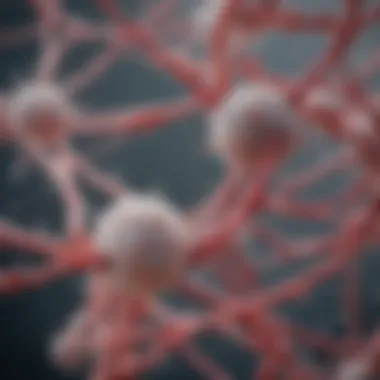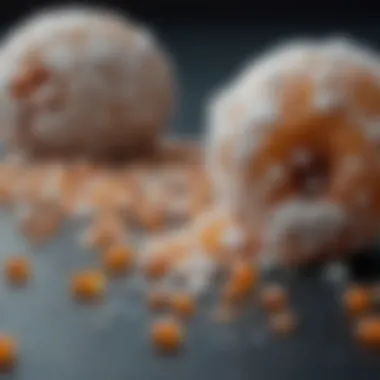Sugar Intake and Prostate Cancer: A Detailed Analysis


Intro
Prostate cancer stands as a significant health concern for men globally, linking closely with various dietary factors, one notably being sugar. Each bite of sugar-laden food might seem innocuous, yet the possible connections between sugar consumption and cancer risk are stirring conversations among scientists and the medical community alike. This discourse is vital to clarify, especially considering that dietary habits play a pivotal role in our health outcomes.
With honeyed sodas and desserts dominating many diets, the cumulative effects of sugar intake cannot be ignored. Exploring the biochemical pathways through which sugar may influence prostate cancer development not only sheds light on cancer biology but also supports or challenges prevailing dietary guidelines. This article dives into the intricate dynamics of this relationship, unraveling the scientific threads tied to sugar and prostate health. To navigate this expansive topic, we will address research highlights, methodology, and practical applications centered on dietary choices.
Stay tuned as we peel back the layers, seeking to forge a pathway that interlinks diet, health, and preventative strategies.
Research Highlights
In the scope of this analysis, several significant findings emerge from both recent studies and long-standing research. Understanding these key points aids in comprehending the depth of the issue at hand.
Key Findings
- Increased Sugar Intake and Risk: Studies reveal a concerning relationship between high sugar diets and increased prostate cancer risk. The more sugar consumed, particularly from refined sources, the higher the likelihood of developing malignancies.
- Insulin Resistance Connection: High sugar diets can lead to insulin resistance. Elevated insulin levels might promote tumor growth, creating a vicious cycle that exacerbates cancer progression.
- Inflammatory Response: Sugars, especially high-fructose corn syrup, can trigger inflammatory responses in the body. Chronic inflammation has been linked to various cancers, including prostate cancer, suggesting that dietary choices can directly affect inflammation levels.
"A balanced diet can be your strongest ally in preventing not just prostate cancer, but also a myriad of chronic diseases."
Implications and Applications
The insights obtained impact several domains:
- Dietary Recommendations: Understanding the link between sugar and cancer could call for revised dietary guidelines, especially for men at risk.
- Public Health Initiatives: Experimenting with education campaigns aimed at encouraging healthier dietary choices could reduce sugar consumption noticeably.
- Further Research Directions: These findings set the stage for fresh explorations, emphasizing the need to analyze how different demographics respond uniquely to sugar intake.
Methodology Overview
Exploring the connection between sugar intake and prostate cancer wasn’t an overnight affair. Researchers utilized various methodologies to arrive at these compelling conclusions, balancing observational studies with clinical trials to build a comprehensive understanding.
Research Design
Most studies have employed a combination of retrospective analyses alongside controlled experiments. This mixed-method approach provides a robust framework for validating findings across varying population samples.
Experimental Procedures
Key aspects of these experiments include:
- Tracking dietary intake via food frequency questionnaires to ascertain sugar consumption.
- Longitudinal studies monitoring prostate cancer incidence among diverse male populations for extended periods.
- Clinical trials assessing the biological mechanisms affected by sugar consumption, particularly focusing on insulin levels and inflammatory markers.
By meticulously pulling threads from different research designs, scientists aim to weave a clearer picture of how dietary sugars might pose risks to prostate health. Those who are engaged in this field must remain vigilant to the nuances of emerging research and continue exploring the dynamic interactions of diet and health.
Prolusion
The subject of dietary sugars and their potential link to prostate cancer is not just a fleeting euphoria but a matter that demands thorough exploration. As prostate cancer figures amongst the leading cancers affecting men, understanding any dietary components that could influence its development is crucial. Studies increasingly suggest that sugar intake, particularly when excessive, may play a role in the disease progression. Unpacking this intricate relationship empowers individuals with knowledge about dietary choices that could potentially mitigate risk.
When diving into the layers of this connection, it becomes clear that the implications stretch beyond mere numbers on a label or the sweetness in your morning coffee. This article assembles a comprehensive view, highlighting mechanisms, citing relevant studies, and laying out dietary recommendations. Not only do we seek to dissect the biochemical underpinnings at play, but we aspire to arm readers—be they students of nutrition, researchers, or healthcare professionals—with actionable insights and understanding.
"It's not just about cutting sugar; it's understanding the why and how behind it."
In the face of potential risks, the role of nutrition emerges unmistakably as a key factor, pressing further the idea that what we eat might very well affect not just our weight, but our overall health, specifically regarding hormonal regulation and metabolic responses.
By synthesizing scientific literature with clinical insights, this guide will peel back layers of complexity, linking sugar intake and the delicate balance of prostate health. Before delving into details, it's essential to grasp the overarching system at play. After all, knowledge is half the battle in fostering a healthy lifestyle and combating deadly diseases.
Sugar: Types and Sources


In examining the connection between sugar intake and its potential effects on prostate cancer, understanding the different types of sugar and their common sources is paramount. This section will elaborate on how natural and added sugars influence health, particularly in the context of cancer risk. Grasping these distinctions is essential for making informed dietary choices that may affect prostate health.
Natural vs. Added Sugars
Natural sugars are found inherently in foods such as fruits, vegetables, and dairy products. These sugars, like fructose in fruits and lactose in milk, come packed with essential nutrients, fiber, and water. Consuming these foods in their whole form means you're also taking in beneficial elements that can support overall health.
On the other hand, added sugars refer to sweeteners put into foods during processing or preparation, like sucrose or high-fructose corn syrup. These sugars are typically found in sodas, candies, and a variety of processed foods. While they provide a quick source of energy, they often lack beneficial nutrients, which is a major concern for developing chronic diseases, including various cancers.
Studies suggest that high consumption of added sugars may contribute to inflammation and metabolic disturbances, both of which are linked to cancer progression.
When discussing sugar's role in prostate cancer, it's crucial to recognize that the body metabolizes these two types differently. Natural sugars are digested more gradually, providing energy along with nutrients necessary for bodily functions. Conversely, added sugars can lead to spikes in blood sugar levels, which may trigger insulin resistance and other metabolic issues.
Common Dietary Sources
The common dietary sources of sugar are varied and can often be misleading. Many individuals might not realize just how much added sugar they consume daily. Here are some frequent culprits:
- Sugary Beverages: Soft drinks, energy drinks, and sweetened teas contribute significantly to daily sugar intake.
- Baked Goods: Cakes, cookies, and pastries are often laden with sugar.
- Breakfast Cereals: Many cereals come with added sugars, even those marketed as healthy.
- Condiments: Ketchup, barbecue sauce, and salad dressings frequently contain hidden sugars.
- Candy and Snacks: These are often obvious sources, leading to excess sugar consumption without nutritional benefits.
It's important for those concerned about prostate cancer to scrutinize labels and remain aware of where sugars are sneaking into their diets. Knowing how to differentiate between natural and added sugars can empower individuals in fighting against potential health risks.
Sugar Metabolism in the Body
Understanding how sugar is metabolized is critical in grasping its effects on health and disease. When sugar enters the bloodstream, insulin is released from the pancreas to help cells absorb glucose. In moderation, this process works effectively. But with excessive sugar intake, systems can become overwhelmed, leading to several adverse health outcomes.
The metabolism of sugar affects the entire body in ways that can be significant. For example:
- Insulin Resistance: Persistent high sugar levels can lead to the body's cells resisting insulin. This resistance is often a precursor for Type 2 diabetes, a condition that has been associated with increased prostate cancer risk.
- Hormonal Imbalance: High sugar diets can influence hormone levels, including insulin-like growth factors (IGFs), which may promote cancer cell growth.
- Inflammatory Response: Excess sugar leads to chronic inflammation, another risk factor in cancer development.
As prostate cancer continues to pose health challenges, being aware of sugar’s effects on the body can inform dietary decisions. Understanding the metabolic pathways involved provides a clearer idea of why curbing added sugar intake is not just about weight management but potentially about cancer prevention as well.
Epidemiological Evidence of Sugar and Prostate Cancer
The relationship between sugar intake and prostate cancer is a growing area of interest in cancer research. Understanding the epidemiological evidence is paramount as it helps elucidate how dietary habits may contribute to cancer risk. By examining this evidence, we can form a clearer picture of the correlations between sugar consumption and the development of prostate cancer, potentially informing prevention strategies and dietary guidelines.
Studies Linking Sugar Intake with Cancer Risk
Numerous studies have explored the potential link between sugar intake and prostate cancer risk. One pivotal research published in The Journal of Nutrition found that men with higher sugar consumption had elevated levels of prostate-specific antigen (PSA), a marker for prostate cancer. This association suggests that sugars can influence hormonal levels or other biological pathways that may trigger cancer cell proliferation.
Moreover, a meta-analysis involving various cohort studies indicated a positive correlation between high glycemic index diets, which are rich in refined sugars, and prostate cancer risk. Among the vast array of data, some studies stand out. For instance, research out of Harvard University identified that consuming soft drinks regularly could significantly increase the risk of advanced prostate cancer. These studies hint at a crucial link but also underscore the complexity of dietary impacts.
Comparative Analysis of Findings
A comparative analysis of different studies offers valuable insights into the nuances of sugar intake and cancer risk. While some investigations propose a direct relationship between sugar and prostate cancer, other research raises differing viewpoints. For instance, a study published in Cancer Epidemiology, Biomarkers & Prevention did not establish a significant link between overall sugar consumption and prostate cancer when controlling for other variables.
The divergence in findings points to the need to consider confounding factors such as body mass index (BMI), physical activity, and the overall quality of the diet. It appears that while sugar intake is a noticeable player in some contexts, it might not hold the same level of influence when analyzed alongside other lifestyle choices.
Critical Review of Epidemiological Studies
Despite the compelling evidence, it's prudent to conduct a critical review of the epidemiological studies available. Many studies on sugar intake and prostate cancer have limitations such as self-reported dietary assessments and small sample sizes, which can introduce bias and reduce the robustness of findings. It’s essential to note:
“Epidemiological research cannot always establish causation, only correlation.”
Some earlier research lacked comprehensive controls for confounding factors, which can skew results. Prospective studies, which follow participants over time, often provide more reliable data, yet they remain scarce in this particular research area.


As we navigate through these studies, the insights gleaned emphasize the necessity for future research that incorporates rigorous methodologies, larger cohorts, and multi-faceted dietary assessments. In doing so, we can draw more concrete conclusions regarding how sugar impacts prostate cancer risk.
In summary, the epidemiological evidence surrounding sugar intake and prostate cancer risk is rich and occasionally contradictory. While some studies firmly link sugar consumption to higher cancer risk, others suggest a more complex landscape, influenced by various factors. As researchers continue to untangle these threads, the hope is to better illuminate the role that sugar plays in prostate cancer development, guiding individuals toward informed dietary choices.
Mechanisms of Action
Understanding the mechanisms of action through which sugar impacts prostate cancer is crucial for several reasons. Firstly, it helps elucidate how dietary choices can influence disease progression. This section seeks to dissect the pathways involved, with emphasis on insulin and IGF, the roles of inflammation and oxidative stress, and how sugar may affect hormonal regulation—all intricately interwoven aspects that contribute to cancer's complex biology.
Insulin and IGF Pathways
The interplay between insulin, insulin-like growth factor (IGF), and prostate cancer is an area of intense investigation. Insulin, a hormone naturally produced by the pancreas, plays a significant role in regulating blood sugar levels. When sugar intake is excessively high, it can lead to insulin resistance, a condition where cells don’t respond effectively to insulin. This state drives the body to produce even more insulin, resulting in chronic hyperinsulinemia.
Elevated insulin levels have been shown to enhance the activity of IGF, a protein that promotes cell growth and survival. Prostate cells, when exposed to elevated levels of IGF, may proliferate more rapidly than usual, fostering an environment conducive to cancer development.
- Elevated levels of insulin lead to:
- Increased proliferation of prostate cells
- Reduced apoptosis (programmed cell death)
- Enhancement in cell survivability
The potential link between high-sugar diets, insulin spikes, and prostate cancer risk merits deeper exploration. A diet high in refined sugars has been associated with rising occurrences of type 2 diabetes, which is also linked to prostate cancer, indicating a potential correlation that requires further research.
Inflammation and Oxidative Stress
Sugar consumption is known to ignite inflammation and oxidative stress, both of which are pivotal in cancer biology. In essence, constant high intake of sugar can stir the immune system into a chronic inflammatory state.
- Oxidative stress refers to an imbalance between free radicals and antioxidants in the body. High sugar levels can elevate free radicals, leading to DNA damage in cells, including those of the prostate.
Research shows that inflammation aids cancer progression by creating a microenvironment that allows for tumor evolution. Prostate cancer cells thrive on signals that are generated by inflamed tissues, potentially enhancing malignancy. Therefore, managing sugar intake could serve as a crucial line of defense against the chronic inflammation that contributes to cancer risks.
"Chronic inflammation and oxidative stress may act as a poison, silently corrupting normal cellular function and steering cells toward a malignant fate."
Sugar's Impact on Hormonal Regulation
Sugar doesn't just stop at influencing insulin and invigorating inflammation; it also has implications for hormonal balance. Hormones play a dramatic role in regulating numerous functions in the body, including those surrounding cancer growth.
The excessive intake of sugar can lead to hormonal imbalances that might exacerbate the risk of prostate cancer. Predominantly, changes in testosterone levels can greatly affect prostate tissue. An imbalance, especially hyperinsulinemia, is known to disrupt the metabolism of various hormones, notably testosterone.
Higher sugar consumption can lead to:
- Increased levels of estrogen
- Altered testosterone metabolism
- Changes in hormone signaling pathways
This hormonal chaos might affect the development of prostate cancer, despite the common perception that diet's only role is as a fuel source.
Dietary Guidelines and Recommendations
Dietary guidelines hold significant weight when it comes to understanding the relationship between sugar intake and prostate cancer. They serve not only as nutritional checkpoints but also as frameworks for making informed dietary choices, especially for those at risk for certain illnesses. In the context of prostate health, these guidelines can illuminate how control over sugar consumption may contribute to lowering cancer risk and improving overall well-being.
Current Dietary Guidelines
The current dietary guidelines emphasize a balanced intake of nutrients, recommending a variety of foods over processed options. In the United States, the Dietary Guidelines for Americans suggest that added sugars account for no more than 10% of total calories — a guideline echoed by many health organizations. This means for an average adult consuming around 2,000 calories daily, added sugars should not exceed 200 calories.
The emphasis is placed on whole foods like fruits, vegetables, whole grains, and lean proteins, while advising organizations and individuals alike to steer clear of sugary drinks and snacks. The rationale behind this is that high sugar intake can lead to obesity, inflammation, and other metabolic disorders, which are implicated in the development of prostate cancer.
Sugar Reduction Strategies


Adopting effective strategies to reduce sugar consumption is vital for those concerned about prostate cancer. Below are several actionable approaches:
- Read Labels: Become familiar with food labeling. A lot of sugar hides in processed foods, even those that seem healthy. Check the ingredient list and look for added sugars under different names such as sucrose, glucose, and high fructose corn syrup.
- Swap Sugary Drinks: Beverages are often the main culprits in added sugar intake. Opting for water, herbal teas, or unsweetened beverages can drastically cut down overall sugar consumption.
- Whole Fruits Over Juice: If craving something sweet, whole fruits are preferable as they provide natural sugars along with fiber, which aids digestion and helps maintain a feeling of fullness. Conversely, fruit juices often contain high levels of concentrated sugars and fewer nutrients.
Making moderate adjustments can significantly reduce sugar intake, ultimately leading to a healthier lifestyle and possibly lowering the risk of prostate cancer.
Integrating Healthy Choices for Prostate Health
Integrating healthy food choices is more than just cutting down sugar; it's about enriching one’s diet with beneficial nutrients that support prostate health. Here are some dietary choices to consider:
- Healthy Fats: Incorporate sources of healthy fats, such as avocados, nuts, and olive oil. These fats can help reduce inflammation in the body.
- Cruciferous Vegetables: Foods like broccoli, cauliflower, and Brussels sprouts are linked to cancer prevention; they contain compounds that may help neutralize harmful substances in the body.
- Stay Hydrated: Don’t underestimate the power of water. Keeping hydration levels up can improve metabolic processes which are key in managing body weight and potentially reducing cancer risks.
Emphasizing a nutrient-rich diet not only contributes to prostate health but also fosters an overall sense of well-being. The intention here is to create a sustainable eating pattern that prioritizes health over fleeting sugar cravings.
"Eating without thinking can lead to dire consequences. A mindful approach to diet serves as your first line of defense against disease."
Research Gaps and Future Directions
The intricate relationship between sugar intake and prostate cancer has commanded attention in the scientific community, yet there remain notable gaps in our understanding. Addressing these gaps is essential not only for advancing knowledge but also for shaping future interventions that may reduce the risk of this prevalent disease. By pinpointing where the current body of research falls short, researchers can prioritize efforts that could yield fruitful insights into the role of sugar in cancer biology and prevention.
One important aspect we need to focus on is the specific biochemical pathways through which sugar influences prostate cancer progression. While we know that sugar can affect insulin and IGF levels, the exact mechanisms at play are far from fully understood. Exploring how different types of sugars—particularly fructose versus glucose—impact cancer cell metabolism could illuminate new prevention strategies. This fine-tuning of our understanding is not just academic but holds practical implications, as dietary recommendations could be tailored to mitigate cancer risks more effectively.
Furthermore, the interaction between sugar consumption and genetic predispositions needs deeper investigation. Individuals have varying susceptibilities to prostate cancer, and understanding how their genetic backgrounds interact with dietary sugar could lead to personalized nutrition strategies. Overall, these considerations highlight the necessity for a multi-faceted approach in future research.
Unanswered Questions in Research
Several critical questions remain unanswered in the landscape of research regarding sugar and prostate cancer. These questions include:
- How does chronic sugar intake influence genetic expression related to prostate cancer?
- Are there distinct differences in cancer risk associated with various sources of sugar?
- To what extent does sugar intake interact with other dietary components such as fats or proteins in influencing prostate cancer risk?
- What are the long-term effects of reducing sugar intake in men at high risk for prostate cancer?
These questions need addressing to ensure we can build a robust framework for future studies and interventions. The nuances in understanding these elements could drive research towards more effective dietary guidelines.
Potential Areas for Future Studies
Looking ahead, several areas could benefit from focused research efforts that aim to bridge existing knowledge gaps:
- Longitudinal Studies: Conduct long-range observational studies to assess how sugar intake over time correlates with prostate cancer incidence and progression. These studies can help reveal patterns that are not apparent in shorter studies.
- Ethnic and Demographic Variability: Investigate sugar impact on prostate cancer risk among diverse populations, taking into account ethnic backgrounds and cultural dietary habits. Differences in metabolism may reveal novel insights.
- Intervention Trials: Implement clinical trials that examine the effects of specific dietary modifications, particularly sugar reduction, on individuals with varying risk levels for prostate cancer. Assessing health outcomes in these groups can provide substantive evidence for dietary recommendations.
- Metabolic Studies: Explore how sugar affects metabolic pathways unique to prostate cancer cells compared to normal cells. This could contribute to targeted therapies based on metabolic dysfunctions.
By concentrating on these areas, future researchers can carve out a pathway toward understanding the potential repercussions of sugar intake in prostate cancer development. Calls for collaboration across disciplines—from biochemists to epidemiologists—will be crucial in tackling these challenges head-on. Such collective efforts might not only shed light on the complexity of diabetes and cancer but also culminate in tangible health benefits.
End
In closing, the intricate relationship between sugar intake and prostate cancer emerges as a significant area of interest for both researchers and health-conscious individuals. This article has illuminated how dietary habits, particularly in regard to sugar consumption, can influence the onset and progression of prostate cancer. Given the relevance of metabolic processes in cancer biology, understanding these dynamics is crucial for both prevention and management strategies.
Summary of Findings
Throughout the discussion, several key points were highlighted:
- The different types of sugar, including natural and added, play distinct roles in metabolic processes.
- Epidemiological studies have shown a potential link between high sugar consumption and increased prostate cancer risk, yet findings remain mixed, warranting further investigation.
- Biochemical mechanisms, such as the interaction of insulin and inflammatory responses, suggest that sugar can influence cancer progression.
- Nutritional guidelines increasingly advocate for reduced sugar intake, emphasizing the need for dietary adjustments.
These elements collectively underscore the importance of adopting a conscious approach to diet, particularly for men concerned with prostate health.
Final Thoughts on Diet and Cancer Prevention
Reflecting on the correlation between diet and cancer prevention, it is evident that dietary choices hold significant power. Avoiding excess sugars may not only lower the risk of prostate cancer but also present broader health benefits. Integrating whole foods, managing portion sizes, and staying informed about nutritional content can equip individuals to make better decisions for their health.
In this era of rising chronic diseases, understanding what we consume becomes pivotal. Men, in particular, should consider periodic evaluations of their dietary habits, remaining mindful of how these choices could affect their long-term well-being. As the research continues to evolve, emphasizing a balanced, nutrient-dense diet may be one of the most effective strategies in the fight against prostate cancer and other health concerns.
"An ounce of prevention is worth a pound of cure." – Benjamin Franklin



